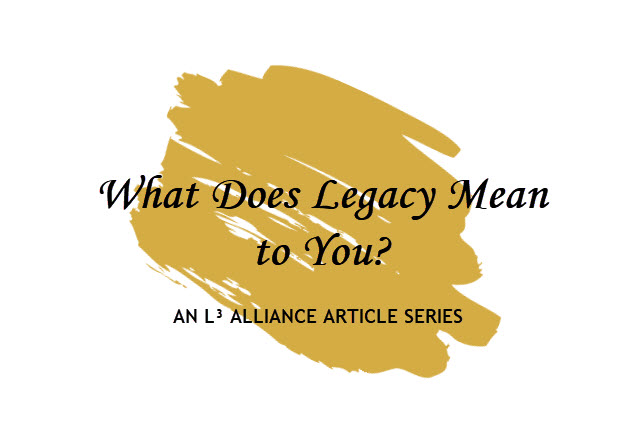The L³ Alliance (Lifestyle, Legacy, and Leading by example) is the women’s group for the Wells International Foundation. Founder & CEO, Dr. Monique Y. Wells, believes it is important for high-achieving professional women to keep the idea of legacy “top of mind” and to observe how doing so influences their impact as leaders. She invites women leaders to reflect on this concept by contributing to the What Does Legacy Mean to You article series.
Today’s article features the musings of Angelique Rewers, CEO and founder of The Corporate Agent. Rewers has been called “The undisputed champion at helping small businesses land big clients” by Inc. Magazine. Her global conferences bring small and diverse business owners together with major brands.

CEO and Founder, The Corporate Agent
L³ Alliance: What does the word “legacy” mean to you?
AR: You hear the word legacy a lot now. The fact that it has permeated our lexicon is a good thing. But I also think it’s important that we not forget legacy isn’t only about doing something meaningful in the short term.
Legacy is about contributing to the world in a way that is long lasting, so much so that the effects are passed down to future generations, even if that contribution isn’t necessarily attributed back to you. When I picture legacy in my mind, I see a stone thrown in a pond. The energy of its impact on the water creates an outward ripple. And that energy keeps going even beyond the point you can still see it. That’s what legacy means to me.
L³ Alliance: How does it apply to you right now as a woman who is a leader in your field?
AR: I wasn’t consciously aware of it until about three or four years into owning my business, but legacy has always been baked into the core mission of what we do as a company. Like a lot of entrepreneurs, my business started out being one thing, and then evolved into another. In 2008, as a side project, I started helping small business owners, especially experts, to market and sell their services to mid-size and large organizations.
These are folks who are all mission-driven change agents. And so, I knew if I could help them get into these companies as consultants, and advisors, and so on, their work would have an enormous ripple effect — not just on employees, but on the entire ecosystem that a company impacts.
However, in the beginning, I wasn’t thinking about legacy; I was just thinking about how to help the client sitting in front of me. But here we are, over a decade later, and I’m not only crystal clear on the legacy I want to have — which is changing organizations for the better by helping the right change agents get a seat at the table — but we’re also watching it happen every day. One of our clients, just as an example, is now going into one of the largest tech brands on the planet to transform their approach to diversity and inclusion. Because they got to the table, they completely reshaped how the leadership in that corporation is thinking about and approaching this goal.
So, for us, the commitment to the legacy drives our entire company and all the decisions that I make, and that we make as a leadership team. And because of that, I know that also makes me a much more courageous, bold and outspoken leader.

L³ Alliance: Do you believe there is a relationship between leadership and legacy?
AR: There certainly can be a relationship between the two. However, I don’t believe it’s necessarily inherent.
L³ Alliance: If so, describe what the relationship is. If not, explain why not.
AR: You can be a great leader that maintains the status quo. But I’m not so convinced that creates legacy in the context most people mean today. Intrinsic in legacy is making some kind of impact. And impact means that something has changed.
Conversely, you can leave a legacy without demonstrating any degree of leadership. Leadership implies a degree of intentionality: there’s a goal, and you’re leading people toward it. But there are many folks who accidentally leave a legacy, or who leave a legacy through cowardice.
So, are the two tied together? Not always.
But, if you are saying “yes, I want to leave a legacy,” then you’ll want to be purposeful in that. And yes, you will also need to demonstrate strong leadership. You will need to ethically influence. You will need to walk your talk. You will need to show courage and strength and integrity. You will need to light the way. You will need to be a leader.
L³ Alliance: How can keeping legacy “top of mind” help you be a better leader?
AR: The most important thing that legacy does for you, is help you make the big, bold decisions that take you outside of your comfort zone.
A misconception in a lot of people’s minds (especially entrepreneurs who are just getting started) is this idea that people who do big things in the world don’t have the same fears that they do. That’s not true.
It’s just that those who are changing the world, do it despite their fears. They don’t let the fear stop them because they know it’s not about them; it’s about something bigger than them. It’s about their impact on the world. That’s the superpower of legacy.


